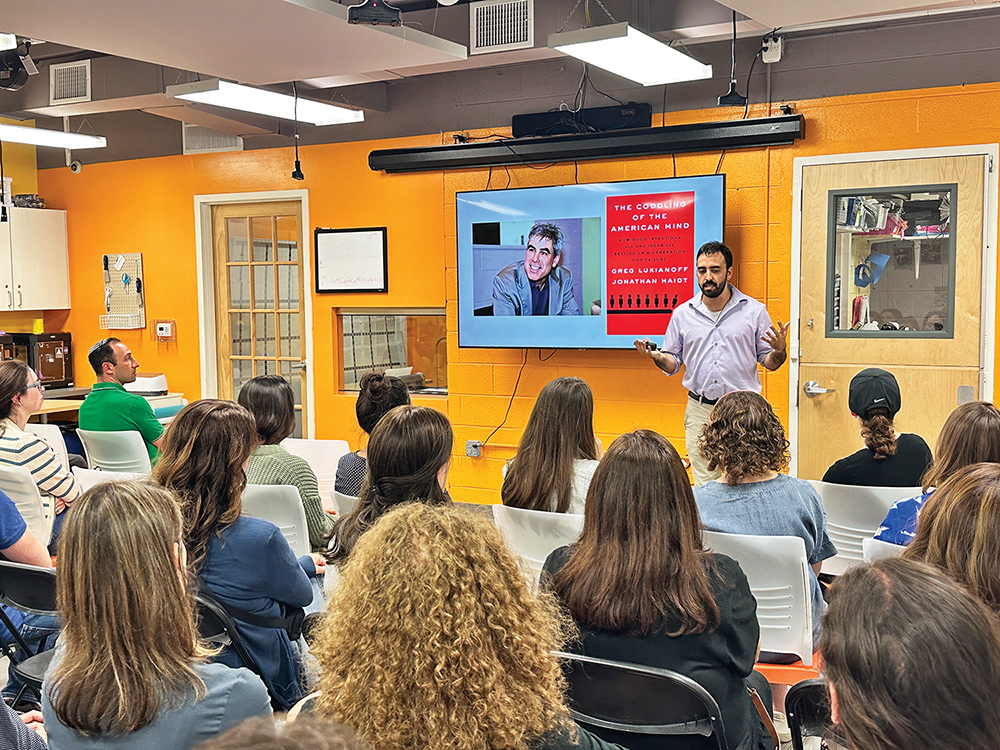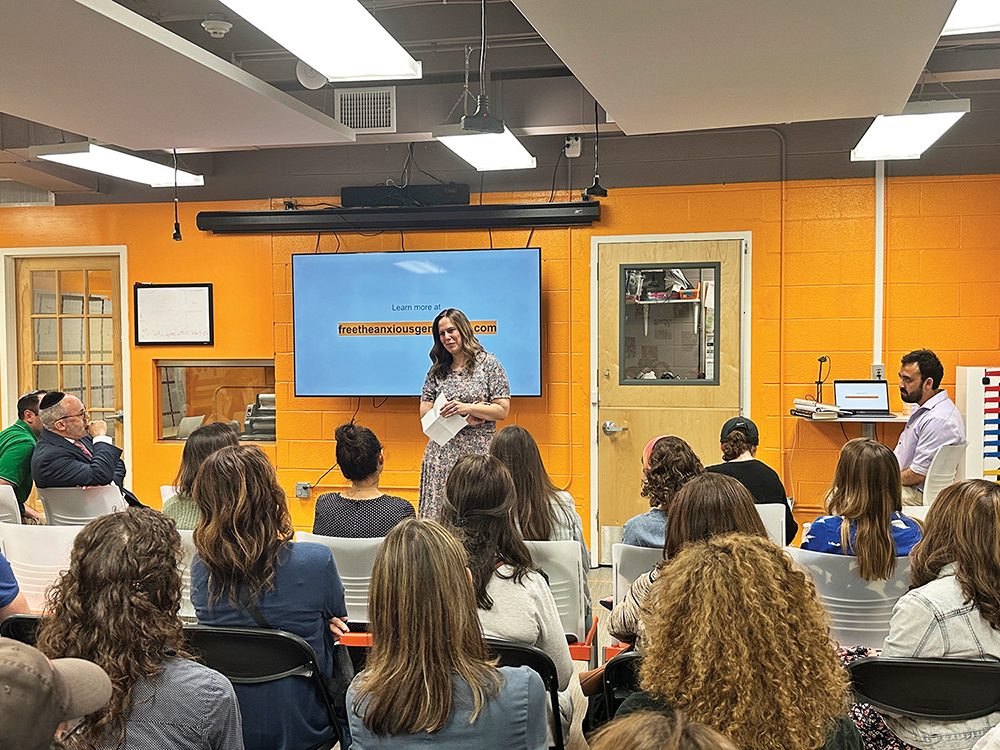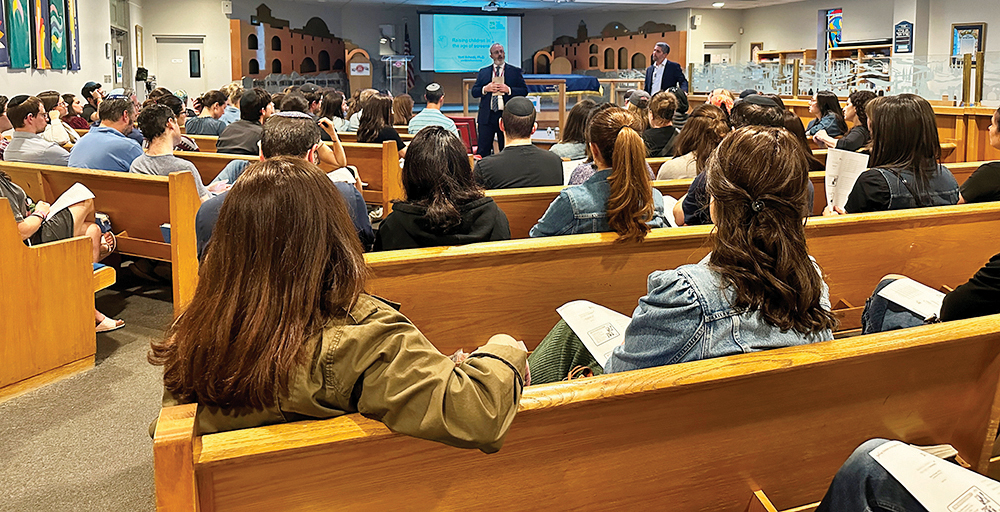
In his introductory letter to the Yavneh family about the Healthy Tech initiative, Head of School Rabbi Jonathan Knapp opened with the current research and noteworthy scholarship on strategies to help reclaim and restore healthy childhood for our children, relative to the detrimental effects of certain technology.
“One of the main takeaways of the research is that the overall challenge of today’s childhood is not an individual
challenge but rather a communal challenge,” said Rabbi Knapp. “There is strength in the power of community—of our community! The time for collective action regarding smartphones and social media is now. Our children are counting on us.”
Zachary Rausch was lead researcher for the new book, The Anxious Generation by Jonathan Haidt, professor of Ethical Leadership at New York University’s Stern School of Business. Rausch presented at a workshop for parents and staff at Yavneh.
Rabbi Knapp reported that this research revealed, “Children from communities of faith seem to be faring better than their counterparts during this rewiring of childhood. They are also encouraged by the capacity of such faith based communities to come together to solve problems through collective action.”
With this backdrop, he shared the advice of Sefer HaChinuch, “When people see that everyone is engaging in a positive action, it will encourage and motivate others.”
Jason David, director of educational technology and curriculum design innovator at Yavneh Academy, focused on sharing his knowledge and experience while fostering a partnership with parents to address the impact of technology on the students. “By working together, we aim to shift norms around technology use to ensure students are using technology in healthy, safe and meaningful ways. When we speak about working together, we include students in the conversation through our digital citizenship classes and by empowering a committee of middle school students to have an active voice in helping build positive technology habits.”

David emphasized that the staff cares about the well-being of the students both in and out of school. They recognize that what happens on personal devices at home affects their character development, school life and religious growth. “Our goal is to build a community-wide effort that helps our students thrive as healthy and well-rounded individuals, upholding the values we instill at Yavneh Academy.”
Middle school guidance counselor Dr. Aliza Frohlich shared, “About six years ago Yavneh Academy initiated a partnership with parents to face the impact of technology on our children. A parent committee was formed to create technology guidelines for grades four to eight and a commitment was made for yearly digital safety workshops for parents. One of the goals of the Healthy Tech initiative is to create a collective action in which parents and children can exert positive peer pressure on each other to limit device use and ensure that the use of technology is safe. Issues like unified shut-off times, time limits, contracts and parental controls were just some topics identified at the time.”
Additionally, a curriculum was implemented to target issues of healthy technology use, like cyberbullying, technology addiction and safe use of technology.
Since then, Frohlich observed, it became evident that they needed to start much younger.
“Through the partnership with our Yavneh Parent Tech Committee we have made a commitment to awaken parents of all ages to get involved by educating them of the dangers of misusing technology. The committee has parent ambassadors for individual grades encouraging parents to sign a parent pledge regarding [a child’s] age for smartphone use and social media, part of the Yavneh Healthy Tech initiative.”
Education, she said, is one key to strengthening this endeavor. “We need to continue educating our students on appropriate use of technology, and the parents as to the dangers and their role. This collective action endeavor by the Yavneh Healthy Tech initiative can protect our children and restore their emotional lives.”
During the past school year, Yavneh held two powerful workshops, one by Dr. Yoni Schwab on the topic of “Raising Children in the Age of Screens,” and the other by Rausch on the topic of “The Challenge of Technology- Collective Action To Restore A Healthy Childhood.” Schwab indicated in his presentation that technology has impacted children’s ability to remain focused and attentive.

Frohlich noted that their educational leaders attended the Jewish Schools and Technology Summit organized by the Tikvah Foundation and the Jewish Parents Forum.
“Some of the seventh and eighth graders have spearheaded the Student Technology Awareness Committee. They launched a number of initiatives among their peers. Most recently, focusing on the fact that we were in the time of Sefirah, they thought it was a perfect time to launch their ‘Be Kind Online’ campaign, encouraging students to focus on thinking before they post, not posting hurtful things and posting things that will make others feel good. They created a video stressing these ideas and distributed stickers for their family and personal devices with reminders to ‘Be sweet and not sour online’ along with ‘sweet’ treats bearing the same message. Another campaign was the ‘Ctrl Your Time, Alt Your Future’ campaign. Students were encouraged to put ‘screen time’ on their family or personal devices to set limits on technology use. Students who registered as joining the campaign were entered into a raffle and participated in an ‘ice screen’ party in school.
“We are proud of the leadership that this student committee has demonstrated and the collective action that they are facilitating,” said Frohlich.
In her role as school psychologist, Frohlich noticed that a large number of children are suffering. “My mission for some years has been to free our children from the possible negative impact of technology use, and partner with and help parents protect their children. All of us who work in schools, no matter what the age, can testify to the hurtful and damaging impact of the misuse of technology. Many children are not mature enough to contain their impulses by thinking before they post or to self-limit their intake.” As a result, she said, they are exposed to online experiences that are harmful to them emotionally.
Frohlich added that they have partnered with other Bergen County yeshivot, stressing the research of Dr. Haidt that underscores the unity of community. In the Jewish community of Bergen County, there is tremendous capability to implement collective action.
Roni Isaacson is the lower school guidance counselor. “Everyone shares the same goal of keeping our children safe and healthy in all aspects, including technology. Given the growing concern about the detrimental impact phones and social media can have on our children, it’s vital for parents to have the opportunity to come together, discuss the various aspects of technology in their children’s lives, stay updated on the most current information, and determine what works best for their families. The newly initiated Healthy Tech Family Pledge aims to shift the baseline norms in our community regarding smartphone and social media use, empowering families to delay these technologies for their children. By working together as a community, we seek to facilitate communal action, educate our students, and ultimately delay smartphone and social media use, fostering a healthier environment for our children. We are fortunate to have such incredible parent involvement and partnership between parents and the school.”
Dr. Nava Krohn and Sara Weinberg co-chair the Parent Committee.
Krohn explained, “We are a group of parents who have been in touch with Yavneh over the years about trying to delay smartphones and social media for our own kids. Rabbi Knapp brought us all together last year to discuss. We formally became the Parent Healthy Tech Steering Committee in February. We shared research with Yavneh parents, set up a parent ambassador program, worked with Yavneh to bring in two world-renowned speakers and now are the first Bergen County yeshiva to officially launch a voluntary parent pledge to delay smartphones and social media.”
Krohn said that the committee is responding to a need expressed by many parents. “We want our kids to value face to face interactions over screens, and we see firsthand the negative effects that smartphones have on kids (and on us!)” She raised the issue that for many parents the only reason they allow smart phones and social media at a young age is the fear of social isolation. She feels it is best addressed by working with other parents.
“Rabbi Knapp has been incredibly supportive and encouraging as he has proven to always put the health and happiness of our children first.
“We at Yavneh are happy to collaborate with any other yeshivot who reach out and to share all of our materials. In fact, my dream is to eventually have a voluntary parent pledge across all of Bergen County.”
Weinberg added, “We collaborated with the school and sent out a parent technology survey to determine whether there would be enough buy-in from the parent body to proceed with a communal initiative. The results of the survey indicated widespread concern among the parent body and an overwhelming desire that the school issue recommendations and best practices for healthier tech choices.” She said that the committee collaborated with the school last summer to post a “Summer Tech” series of emails focusing on different tech topics: social media, sleep disruption, mental health implications, etc., and provided resources to learn more about these issues.
“Recently, Nava and I, along with a number of school administrators, attended Tikvah’s ‘Jewish Schools and Technology Summit.’ There they spoke with administrators and parents from yeshivas across the U.S. and Canada.”
Their response was to initiate Yavneh’s Healthy Tech Family Pledge, which was recently launched, and is a voluntary pledge to delay smartphones and social media until after eighth grade. The pledge provides a framework for communal action that will ideally empower people to make the choice to delay smartphones and social media with the strength of a supportive community doing it together. The hope is that parents will feel encouraged to make the healthier and safer choices, without fear of social isolation. “Many families have signed on, and we’re confident more will continue to sign on in the coming weeks. I’m excited that we have taken the first concrete step towards solving it together.”
Weinberg added a clarification: “This pledge is not attempting to ban all phones. It is specifically targeting smart phones. In other words, a parent who wants to give their child a smartphone alternative with talk and text capabilities can still feel comfortable signing the pledge.”
The pledge language and resources provide FAQs and a list of smartphone alternatives.
Weinberg concluded, “We are so encouraged by the outpouring of support and excitement since we launched the pledge and by the large number of families that have signed the pledge in just the first couple of weeks. We already see a critical mass coming together at Yavneh that will be able to create a change in communal norms.”









